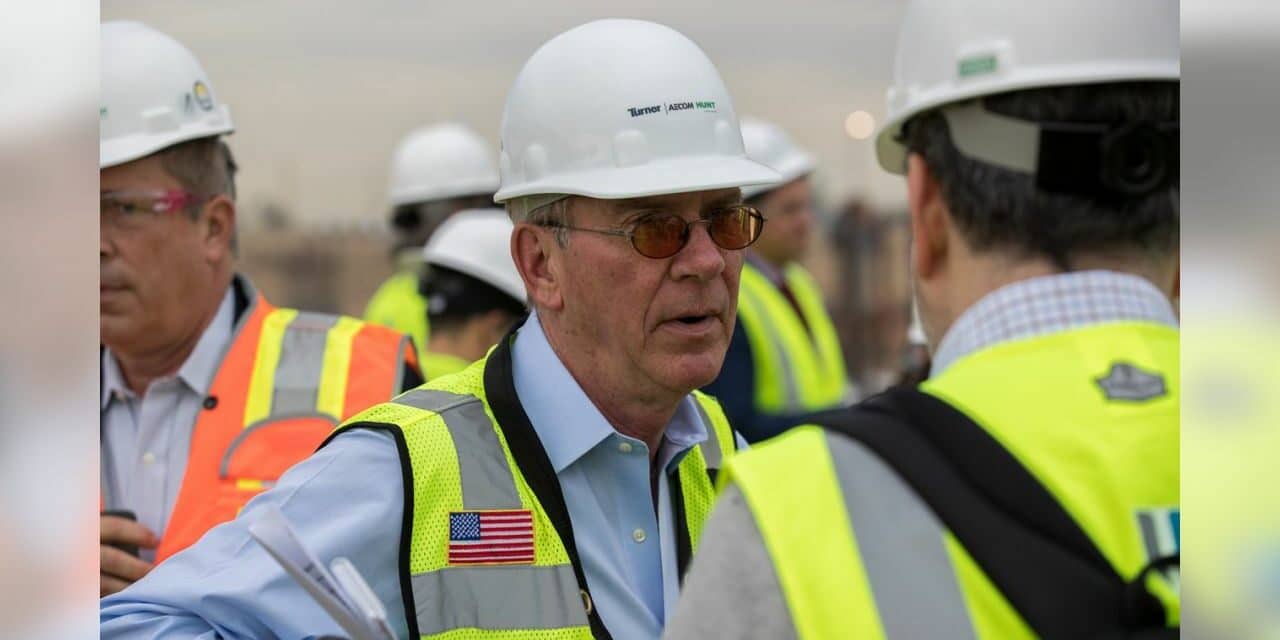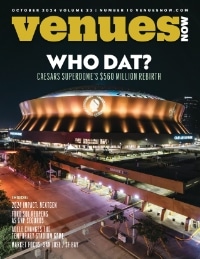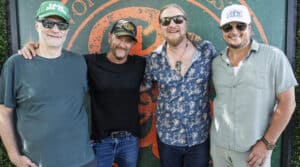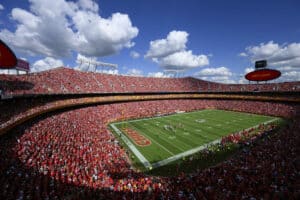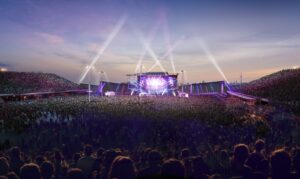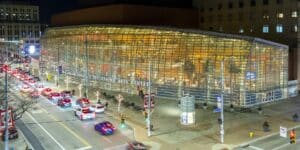IN BOB WE TRUST: Bob Aylesworth, shown here during SoFi Stadium construction, served as a mentor to many people starting their careers in sports facility development. (therams.com)
‘Steady hand’ running high-pressure sports developments
Sports construction pioneer Bob Aylesworth stood among the most trusted people in the business, armed with a calm demeanor and mindset to effectively deal with billionaire team owners building arenas and stadiums.
Aylesworth, an executive vice president with AECOM Hunt whose overall career in construction spanned 45 years, mostly on the West Coast, died on Sept. 11. He was 73.
His colleagues described Aylesworth as a gifted leader and problem solver, managing more than a dozen big league projects, running from America West Arena in Phoenix, Arizona, now Footprint Center, to SoFi Stadium, his final project in Inglewood, California.
“Bob was a building guy and he liked to organize projects and motivate people,” said Ken Johnson, an executive vice president with AECOM Hunt and Aylesworth’s counterpart handling East Coast projects. The two knew each other for 27 years. “That was the big impression he left on all us. He worked hard and taught others to treat people with respect. He was the guy who would look to solve problems first and not blame others.”
Over five decades, Aylesworth saw multiple trends emerge in sports facility development, extending from privately-funded projects led by developers such as Pac Bell Park, home of MLB’s San Francisco Giants, now Oracle Park, to the evolution of retractable-roof stadiums and structures covered with clear plastic roofs to filter sunlight, to the wireless technology that dominates big league buildings in the modern age.
“Bob enjoyed collaborating with architects to get the project off on the right foot,” said Bill Johnson, design principal for HOK, who worked with Aylesworth on both the Phoenix Suns arena and Arizona Diamondbacks stadium, the industry’s first natural grass ballpark with a retractable roof. “He had a real appreciation with design and didn’t prioritize the project value or the schedule over the quality of design.”
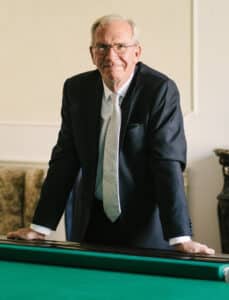
Bob Aylesworth (Courtesy AECOM Hunt)
Along the way, he gained the trust of NFL team owners such as Stan Kroenke and Michael Bidwill, and officials with Guggenheim Partners, owner of MLB’s Los Angeles Dodgers, where Aylesworth led a quick turnaround of a $100 million renovation of Dodger Stadium prior to the 2013 season. One year before Hunt Construction Group was acquired by AECOM, the firm completed the job in five months, due in part to Aylesworth’s leadership, Johnson said.
“Sports projects are not easy,” said Bob Hart, AECOM Hunt’s president of construction management. “There’s lots of stakeholders, both public and private, and Bob was on both sides of it.”
In addition, Aylesworth served as a mentor to many folks breaking into the stressful business of constructing venues costing hundreds of millions of dollars — and reaching into the billions toward the end of his career.
“Bob Aylesworth provided me with an opportunity to work for him in 2001 and I will be forever grateful,” said Troy Hoberg, who spent more than 20 years with AECOM Hunt in Scottsdale, Arizona before taking a job with Legends as senior vice president of project development in 2022. “He was an incredible boss and a friend. I learned so much from him during the time we worked together. The industry has lost a gem and true leader.”
Hart also considered Aylesworth a mentor after working alongside him for more than 20 years in Scottsdale.
“Bob was level headed and always focused on what’s best for the project,” he said. “He taught me that early in my career, that if we took that approach, the rest will take care of itself. It was Bob’s leadership that helped our company figure out how to build these facilities and how to move roofs and fields, all that kind of stuff.”
His competitors tipped their hardhat to Aylesworth as well, including Dale Koger, PCL Construction’s vice president and general manager for sports and convention centers. Koger competed for sports jobs against Aylesworth dating to 2000 when Koger started working at Turner Construction Years later, Koger served as Legends’ senior vice president and managing director in the early stages of SoFi Stadium development, working in tandem with Aylesworth.
“Team owners always seemed comfortable with Bob,” Koger said. “He was a fierce competitor, but a wonderful friend, the kind of guy you’d want to go have a beer with and chat. That’s not always the case, but strong, healthy competition is good for the industry and that’s how I always viewed my relationship with Bob.”
Aylesworth worked on a combined seven NBA and NHL arenas and MLB parks during the building boom of the 1990s before turning his attention to building a new stadium for the Arizona Cardinals in the early 2000s, where both the roof and playing field were movable structures, a first in North American sports.
His last hurrah, SoFi Stadium, materialized after AECOM Hunt formed a joint venture with Turner to build the $5 billion-plus NFL facility for the Los Angeles Rams and Chargers.
After spending several years at the corporate level leading AECOM Hunt’s West Coast operations, Aylesworth returned to the field in 2016 to help supervise the most expensive and complex job in sports.
He volunteered to work on SoFi Stadium, according to Johnson. It was the perfect fit. In Hart’s opinion, Aylesworth stood at the top of the list among a select few construction professionals qualified to lead the project.
Aylesworth and Hart teamed with Turner’s Peter Davoren, Rick Bach and Mike Kurtz to spearhead the effort, which started with digging a hole 100 feet below ground on a site under the flight path of Los Angeles International Airport.
From day one, SoFi Stadium became a challenging project, tied to a construction timeline extended one year due to torrential rains in Greater Los Angeles. It doubled in cost over initial projections, only to open in 2020 for NFL games and concerts without fans due to the pandemic.
Despite those critical issues, Aylesworth’s expertise and steady management style ultimately resolved those crises in completing the NFL’s newest crown jewel in the nation’s second-biggest market. At that point, his 40 years of experience at AECOM Hunt brought Aylesworth to that place to be able to deliver the facility, Hart said.
Aylsworth always had a positive attitude on the job site in Inglewood, regardless of the obstacles. It was noticeable and appreciated by the project team, said Mark Williams, global director of sports at HKS, the architect for SoFi Stadium.
“I admired him for that and told him so many times; being in the trenches with somebody on a project like this, you get to know them pretty well, going through the good moments and bad ones,” Williams said. “If you stay focused and keep the end goal the same, which he was great at, then you get there. That’s the biggest complement I can pay him.”
SoFi Stadium could not have been completed without Aylsworth and his even-keeled manner, said Otto Maly, president of Kroenke Holdings and managing director of SoFi Stadium.
“He was able to mold two construction companies together to make a cohesive effort,” Maly said. “We had a lot of challenges. I saw him in a lot of tense situations and you could always count on Bob to pull it together and settle everybody down. Everybody looked up to him.”
Davoren, Turner Construction’s chairman, CEO and president, concurred with Maly’s assessment of Aylesworth’s management skills.
“Bob was the chief negotiator for how to get that project completed and brilliant in the way he navigated it,” Davoren said. “Bob had a diplomatic way about him that was unbelievable. He could size people up and accommodate his personality to match others’ personalities. He was chameleon-like in that regard. The term ‘joint venture’ did not exist. We were one team and it was amazing. Bob was truly one of the greatest people I’ve met in the industry.”
